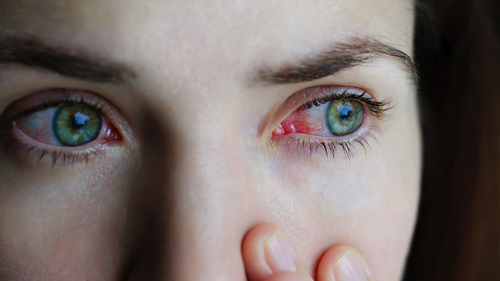Uveitis
Commonly referred to as eye inflammation, uveitis is an eye condition that affects the middle layer of your eye, known as the uvea. Uveitis is commonly diagnosed in patients between the ages of 20 and 50. In rarer cases, uveitis may also affect children.
Those with uveitis often experience very uncomfortable symptoms and warning signs. These include blurred vision, redness, and pain around the eyes. Uveitis is a serious eye condition that can lead to complete vision loss if left untreated and can be related to other medical problems.
What Are The Symptoms Of Uveitis?

In most cases, uveitis symptoms develop rapidly. In some patients, symptoms may develop gradually over time.
Signs, symptoms, and attributes of uveitis include:
- Eye pain
- Blurred/decreased vision
- Light sensitivity
- Eye redness
- Dark spots/eye floaters
These issues can affect one or both eyes at the same time. This varies from patient to patient.
Contact the eye doctors and ophthalmologists at Ginsberg Eye if you are experiencing any of the symptoms listed above. Ginsberg Eye is Naples, Florida’s leading uveitis and eye care specialist.
What Causes Uveitis?
In many cases, it can be difficult to diagnose the specific cause of uveitis. This is partly because many patients have no specific factors that caused the condition to develop. Uveitis can commonly occur in otherwise healthy patients.
In cases of uveitis that do have an identifiable cause, it is often one of the below:
- Eye surgery or injury
- Inflammatory disease or disorder
- Pre-existing autoimmune disease
- Infection on or around the eye
- Existing eye cancer
If left untreated, uveitis can develop many other vision problems. These include:
Schedule an appointment with the eye care staff at Ginsberg Eye if you have experienced any of the symptoms or causes above. Our staff can help you learn more about uveitis and how it has affected your vision, and develop a treatment plan to help control the condition.
How Is Uveitis Diagnosed and Treated?
We are able to determine an underlying cause of uveitis, the course of treatment will depend on the pre-existing condition. In order to reduce the inflammation caused by uveitis, there are several treatment options that may be advised to decrease pressure and eye pain.
Anti-inflammatory drugs such as a corticosteroid medication may be prescribed in the form of eye drops or oral medication. An injection may also be used if the inflammation does not subside.
We may also prescribe a medication to prevent the spread of bacteria or viruses if the condition has been caused by an infection. Antibiotics or antiviral medications can help to control the infection and help the body heal. If uveitis occurred because of an autoimmune disorder, doctors may use immunosuppressive drugs.
Uveitis treatment is based on several factors and is evaluated on a case-by-case basis by eye care professionals. The largest factor is the specific type of uveitis you have, and how it developed.
Schedule an appointment with the Ginsberg Eye staff to learn more about your vision and uveitis treatment options available in the Naples, Florida area.





